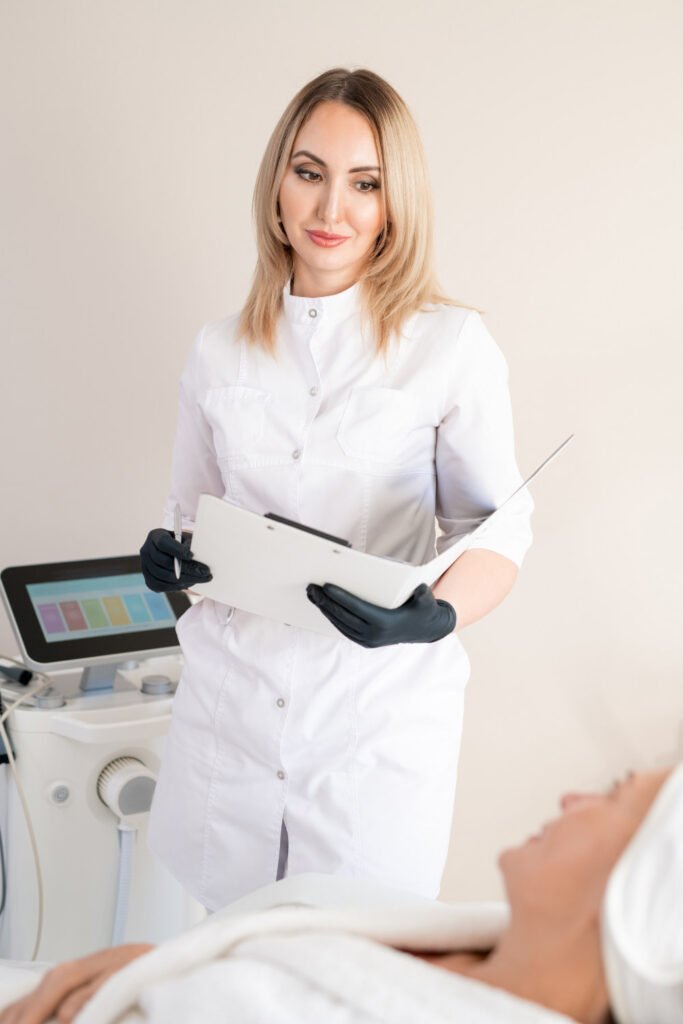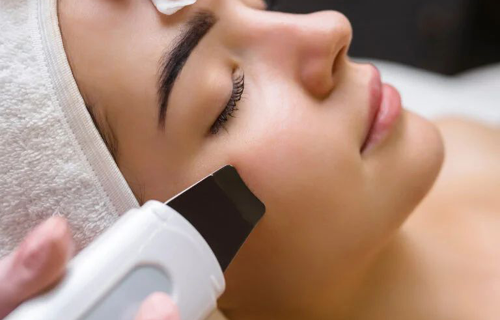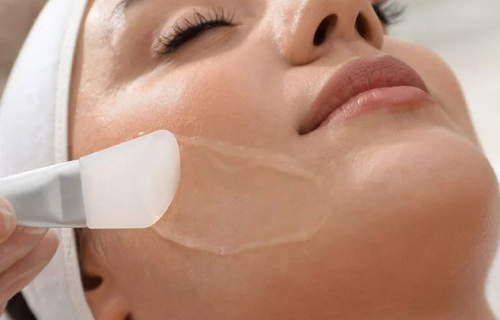
Say goodbye to blemishes and uneven skin tone. Book your IPL Phototherapy appointment today!
Pigmentation Treatment
Do you want to restore a healthy glow and an even skin tone can be achieved safely and effectively – IPL phototherapy treatment for pigmentation is perfect for you. Have you ever been annoyed by pigmentation problems that impair your appearance, such as freckles, dark spots, or other blemishes? IPL phototherapy is an innovative technique for treating pigmentation, evening out your skin tone and restoring a more young, revitalised appearance. With the help of this procedure you can treat skin and aesthetic problems, such as pigmentation, whether from sun exposure, ageing or hormonal fluctuations. And also look your best every day and enhance the condition of your skin while also boosting your confidence.


Time:
20-45 min

Number of session:
3-6 sessions

Resultats:
6 months to over a year

Duration between session:
3-4 weeks
*The effects of IPL Phototherapy can last 6 months to 1 year, but lasting results are only achieved after completing the full course of 3-6 sessions. The duration of the results depends on your skin’s individual characteristics, lifestyle, and post-treatment care.

How does IPL Phototherapy for Pigmentation Treatment work?

IPL Phototherapy is a cosmetic procedure that uses broad-spectrum light to treat all pigmentation problems in skin. Unlike traditional lasers , which use a single wavelength of light, IPL generates light at different wavelengths, this helps it to effectively target pigmented areas without damaging the surrounding skin.
The basic principle of IPL is the effect of light pulses to pigmented skin patches, such as melanin (which gives skin its colour) and haemoglobin (a pigment found in blood). These pigments absorb light, dissolving undesirable cells and structures including dark patches. As a result the appearance of dark spots and uneven skin tone is reduced, leading to a brighter and more even complexion.
Consultation with a specialist
Before starting the procedure we advise to have a consultation with our specialist, who will analyse your skin condition and determine the best locations for treatment.
Avoid suntan
Refrain from sun exposure and tanning beds 2-4 weeks before the procedures. Because the light targets pigmented parts of the skin, tanning increases the risk of burns or pigmentation during IPL treatment.
Use sunscreen
Always use sunscreen with an SPF of 30 or greater to protect your skin from UV radiation, even if you’re not in direct sunshine.
Avoid of hair removal
A week or more prior to your visit, avoid using wax tweezers or hair removal treatments on the areas that will be treated because they may cause skin irritation.
Arrive skin-clean
Don’t apply moisturisers, makeup, perfumes or any other products on the regions that will be treated on the day of your treatment.
Avoid clear or harsh treatments
Don`t do peelings, laser treatments and other harsh skin care procedures one week before IPL Phototherapy.

Hydration
Use calming and moisturising cosmetics on the skin. This will improve the procedure’s effectiveness and help keep the moisture level of your skin.
Avoid clear heat treatments
Saunas, hot baths and other treatments that could result in skin overheating should be avoided for a few days after the procedure
Avoid the sun
Use sunscreen with an SPF of 30 or higher and avoid direct sunlight for the next two to four weeks after your treatment.
Steer clear of heat treatments
To prevent overheating of the skin, stay out of hot baths, saunas, hot tubs and physical activity for 48 hours following your treatment.
Do not pick at your skin
Avoid picking at any tiny scabs or peeling that you may see after the therapy. If you want to avoid dark spots or scars, let your skin recover naturally.
Schedule your next session
Make your next appointment in 4-6 weeks if you think you’ll benefit most from repeated IPL Phototherapy sessions.

We work in a personalised way with Your Needs
Every treatment is customised to suit your unique needs for the best experiences and outcomes. We offer you individual consultation with our Specialist to explore the best treatment options.


What Types of Pigmentation IPL Treated?

Age Spots: Usually found on the face, hands,and shoulders, these are flat, brown or black patches that develop on skin that is often exposed to the sun. IPL can effectively lighten these spots and reduce their visibility.
Sunspots: Prolonged exposure to UV rays causes sunspots, which are similar to age spots. IPL can help reduce their number of existing lesions and stop new ones from developing.
Freckles: Small, concentrated patches of melanin are called freckles. A more even skin tone can result from IPL’s ability to lighten these spots.
Melasma: A disorder that results in broad, darker skin areas; frequently brought on by hormone fluctuations. IPL may reduce melasma’s severity, but it might take several sessions.
Post-Inflammatory Hyperpigmentation: Dark patches that appear following an injury or inflammation (like acne). IPL can help in fading these markings.

Contraindications for the Procedure
Pregnancy and lactation
It is not advised to have the procedure done when pregnant or breastfeeding.
Active Skin Infections or Conditions
It is contraindicated to have active infections or inflammatory processes, such as herpes simplex (cold sores), eczema, psoriasis or severe acne in the treatment region
Photosensitivity
IPL treatment is not recommended to patients who have a history of photosensitivity, which is a high sensitivity to light, or who are taking medications that promote photosensitivity, such as some antibiotics, accutane for acne, or chemotherapy medicine.
Sunburned or Tanned Skin
IPL raises the risk of burns, hyperpigmentation, and other negative effects, hence it is not advised for skin that has recently become tanned or sunburned. Before and after the procedure, patients should refrain from tanning for at least 2-4 weeks.
Very Dark Skin Tones
For those with extremely dark skin tones, IPL is less effective and may result in a higher risk of adverse effects, including burns and hyperpigmentation (Fitzpatrick skin types V and VI). For certain people, alternative therapy choices could be more appropriate.
Blood Thinner Usage
Patients on anticoagulants, which thin the blood, may be more vulnerable to bleeding or bruises both during and after the procedure. Speaking with a healthcare professional is crucial prior to having IPL surgery.
Use of Retinoids or Tanning Products Lately
IPL should not be used by anyone who has used self-tanning products or topical retinoids (like Retin-A) in the last two weeks since these can increase skin sensitivity and the possibility of negative effects.
Long-Term Medical Conditions
Before contemplating IPL phototherapy, patients with specific chronic health issues, such as uncontrolled diabetes, autoimmune disorders, or active cancer, should speak with their healthcare professional.
Intraoral or Pacemaker Devices
IPL treatments should be avoided by people who have pacemakers or other implanted electronic devices since the light pulses may cause interference with their functionality.
Tattooed Areas
IPL should not be used on skin that has already received tattoos since the light may react with the ink, resulting in burns, fading, or other issues.
Fresh Surgery or Open Wounds
Until the skin has completely healed, the technique should not be performed on places that include cuts, open wounds or recent surgical sites.
Age Restriction
Pigmentation Treatment is only available to individuals who are 18 years of age or older. Minors are not eligible for the procedure, as hormonal changes during adolescence can affect hair growth and reduce the effectiveness of the treatment.
Why choose us

Advanced Technology
We use cutting-edge laser and skincare technology to ensure our treatments are both safe and highly effective.

Expert Team
Our team of professionals is not only highly trained but also deeply experienced in their fields. They take the time to understand your specific needs and tailor each treatment to suit you perfectly

Comprehensive Services
Whether you’re looking to remove unwanted hair, rejuvenate your skin, or contour your body, we’ve got it all covered. Our wide range of services means you can address multiple concerns in one place.
Related Treatments

– Reveal deeply cleansed, glowing skin with HydraFacial
– Enjoy visible improvements that leave your face looking refreshed and hydrated
– Non-invasive treatment designed to gently exfoliate, hydrate, and rejuvenate your skin

– Reveal smoother, radiant skin with Cosmetic Peels
– Enjoy visible improvements that leave your face looking refreshed and rejuvenated
– Non-invasive treatment designed to gently exfoliate and improve skin texture for a brighter, more youthful appearance
Frequently Asked Questions
The majority of patients have a feeling of somewhat warming or tingling but it's not so strong. So the procedure is usually well-tolerated and doesn’t require anaesthesia.
IPL works best for treating post-acne marks and inflammatory acne. For non-inflammatory forms of acne, such as blackheads or whiteheads, it might not be so effective. The answer to whether IPL is correct for you will have a consultation with our specialist.
Potential negative effects after the procedure are temporary redness, mild swelling or mild sensitivity in the treated area. Most of the time, these symptoms subside in a few hours or the following day.
Yes, topical medicines and chemical peels can be used in combination with IPL to treat acne. To be sure the combination is secure and efficient, it's important to have a consultation with our specialist.
While some patients see the results after the first session, we recommend an amount of sessions to observe more noticeable outcomes.
Our happy customers
Sarah T.
James L.
Olivia K.
Rachel P.
Sign up for exclusive offers
Our highly-trained team of Therapists can help identify your concerns and tailor a treatment plan based on your skin goal.






